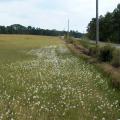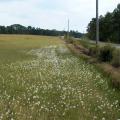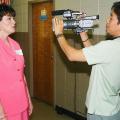Feature Story from 2003
MISSISSIPPI STATE -- The catfish industry's cash-strapped producers are set to receive their first-ever federal disaster assistance, and it couldn't come soon enough.
Feed accounts for half the cost of raising catfish and was $220 per ton in Mississippi in 2002. Catfish prices are at the lowest levels in 20 years and producers are finding themselves in financial stress.
MISSISSIPPI STATE -- Poultry and egg prices have rebounded from the challenges of 2002 and are soaring into the fall in much better shape than they were last year.
Tim Chamblee, poultry management researcher with the Mississippi Agricultural and Forestry Experiment Station, said increased consumer demand and reduced numbers of chickens have combined to boost prices for broilers and eggs.
MISSISSIPPI STATE -- Structural construction on Mississippi's long-awaited 4-H museum is officially under way.
The July 20, 2002, groundbreaking for the Pete Frierson Mississippi 4-H Museum in Jackson began phase one of the project. During this time, organizers raised funds and prepared for the initial construction of the museum.
MISSISSIPPI STATE -- An invasive weed with no known value has made its way across half the state and shows no signs of letting up.
Cogongrass competes with desirable grasses and wins the battle for nutrients, but it is a very poor forage. Mississippians are learning the hard way that it is very difficult to keep this grass at bay.
John Byrd, Extension weed scientist with Mississippi State University, said the weed invades low-maintenance areas or those not in cultivation. It out-competes other grasses, yet provides nothing of value.
MISSISSIPPI STATE -- A non-native weed is threatening state roadsides, pastures and forests, and while it may not spread as fast as kudzu, it is dangerously invasive.
Cogongrass is an aggressive warm-season, perennial grass that is difficult to control. It is native to southeast Asia and was accidentally introduced to the United States in 1911 at Grand Bay, Ala. It spread to other states in the 1920s as Experiment Stations evaluated it as a potential forage crop in Mississippi, Florida and Alabama.
MISSISSIPPI STATE -- Generous summer rains and moderate temperatures helped many Mississippi dryland corn fields produce Midwest-size yields, but other fields could not turn off the faucet and suffered for it.
Erick Larson, grain crops agronomist with Mississippi State University's Extension Service, said the state's corn fields should produce a new record average, which is becoming an every-other-year tradition. Records were set in 1997, 1999 and 2001, and were 107, 117 and 130 bushels per acre, respectively.
MISSISSIPPI STATE --"Lions and tigers and bears, oh my," Dorothy exclaimed in the "Wizard of Oz." While there are no lions, tigers or bears, one of Dorothy's traveling companions would feel right at home at the North Mississippi Research and Extension Center in Verona.
The center's Scarecrow Trail opened to the public Sept. 20 and will remain open 8 a.m. until 5 p.m. weekdays through Oct. 17. The trail winds through flower gardens filled with roses, irises and other flowers, and landscape plants. More than 40 scarecrows are strategically located along the garden paths.
MISSISSIPPI STATE -- Foresters and landowners can learn about tax issues ranging from deducting expenses to taking reforestation credits during upcoming short courses offered across the state this fall.
Debbie Gaddis, forestry tax specialist with Mississippi State University's Extension Service, will teach the six-hour sessions for Webster, Forrest, Lamar, Yalobusha, Jackson, Jasper, Smith, Newton and Adams counties. Foresters and landowners from other counties are invited to attend at the most convenient location.
MISSISSIPPI STATE -- Mississippians have great ideas for innovative products, and Mississippi State University helps make those business dreams a reality.
From manufacturers of hair bows and goat milk soap to billion-dollar furniture manufacturers, no job is too small -- or too big -- for the experts at MSU's Food & Fiber Center.
MISSISSIPPI STATE -- A new network is available to let owners of Mississippi microenterprises know they are not alone and to offer them assistance as they grow.
The Mississippi Micro-Enterprise Association Network consists of service providers to microenterprises. The Mississippi State University Extension Service is a charter member of this group that focuses on promoting job creation through microenterprise.
MISSISSIPPI STATE -- In good times and in bad, those trying to gain employment in Mississippi have an ally in the Mississippi State University Extension Service.
The state had a 7.2 percent unemployment rate in July. That figure in recent years has hovered between 5 and 6 percent, but the national recession is being felt statewide. Some large companies have shut down, and many other businesses have laid off workers in an effort to curb expenses and remain profitable.
MISSISSIPPI STATE -- North Delta cotton growers are hoping that the third time is the charm as they prepare another referendum this season to continue their participation in the regionwide boll weevil eradication program.
The grower-requested third referendum will take place from Sept. 29 through Oct. 10. The local Farm Service Agency offices will count the results on Oct. 17.
MISSISSIPPI STATE -- Mississippi State University's head of therapeutic riding was elected to a two-year term as regional representative of the North American Riding for the Handicapped Association.
MISSISSIPPI STATE -- Irradiation technology significantly decreases the risk of bacteria and parasite contamination in foods, but consumers must still handle the food properly.
Irradiation is the process of exposing food products to radiant energy including gamma rays, electron beams and X-rays in amounts approved by the Food and Drug Administration. The technology is not new, and its increased use over the last few years prompted Mississippi State University's Extension Service to educate area agents about this technology.
MISSISSIPPI STATE -- For a group of Mississippi State University alumni, Sept. 26 was a day to give back something of themselves to their alma mater and the students following in their footsteps.
The 18 former MSU students came back to campus to share with current students what they have learned in the real world. The event was the Department of Agricultural and Biological Engineering's Alumni Career and Research Day, held in the auditorium of the Bost Extension Center.
MISSISSIPPI STATE -- Two of Mississippi's biggest fall horticultural crops are nearing harvest's end, and pumpkins appear to be faring slightly better than pecans.
David Ingram, associate plant pathologist at Mississippi State University's Central Mississippi Research and Extension Center in Raymond, said pecan scab has been severe this growing season. The disease causes nuts to fall off the trees too early or not fill out completely.
MISSISSIPPI STATE -- Efforts to teach Mississippi youth financial responsibility have attracted international attention and may help educate South Korean society in many of the same important life lessons.
"Money Matters: Financial Literacy Seminars for High School Students" workshops are being held around the state between September and April. Seminars are sponsored by the Mississippi Jump$tart Coalition and the Office of the Mississippi Secretary of State. The Mississippi State University Extension Service and BancorpSouth are also actively involved.
MISSISSIPPI STATE -- The second most common type of cancer in women has an entire month dedicated to its awareness.
October has been set aside as Breast Cancer Awareness Month. Each year, about 43,300 women and 400 men die of breast cancer.
By Tricia Hopper
MISSISSIPPI STATE -- As common as cowbells and bulldogs, Mississippi State University's bright red Edam cheese "cannon ball" is easily recognized at tailgates and parties across the state and beyond.
Ever since Edam cheese was first introduced on the Starkville campus in 1938, fans of this dairy delight have made it a university trademark. The Mississippi Agricultural and Forestry Experiment Station's Sales Store sold about 42,000 regular Edam cheese balls during the 2002 Christmas holiday season.
MISSISSIPPI STATE -- Long before a hunter can display a trophy buck on the wall, a landowner somewhere had to follow a plan that encouraged that buck's growth.
Quality deer management is the strategy used to produce big deer by controlling the environment and deer population. The goal is to produce older bucks with big antlers.
Ben West, assistant professor of wildlife with Mississippi State University's Extension Service, said unmanaged deer populations grow large and tend not to produce the trophy bucks.
Pages
Feature Story Archive
- 2025 (64)
- 2024 (116)
- 2023 (114)
- 2022 (112)
- 2021 (104)
- 2020 (140)
- 2019 (126)
- 2018 (141)
- 2017 (197)
- 2016 (240)
- 2015 (319)
- 2014 (355)
- 2013 (371)
- 2012 (343)
- 2011 (246)
- 2010 (236)
- 2009 (229)
- 2008 (188)
- 2007 (210)
- 2006 (199)
- 2005 (224)
- 2004 (215)
- 2003 (228)
- 2002 (176)
- 2001 (184)
- 2000 (188)
- 1999 (180)
- 1998 (178)
- 1997 (188)
- 1996 (58)
- 1995 (36)




